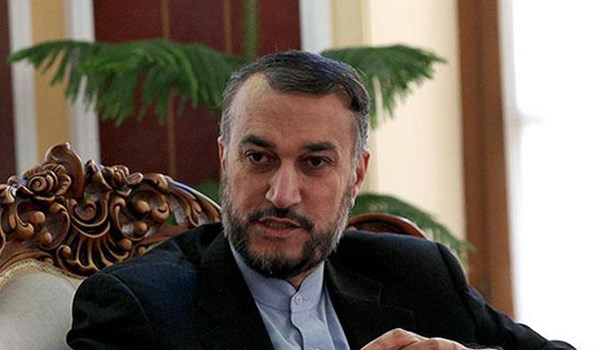
RNA - The Iranian former deputy foreign minister for Arab and African affairs, made the remarks after the US President Donald Trump told a campaign rally in Southaven, Mississippi, on Tuesday, that Saudi Arabia and its King would not last "two weeks" in power without American military support, calling on the country to pay more for its own defense.
“Trump keeps threatening and humiliating the Persian Gulf littoral Arab states on a daily basis,” reads the message Amir Abdollahian posted on his Twitter account.
Saying that the Islamic Republic of Iran deems the withdrawal of American troops beneficial to the Middle East region, the Iranian diplomat urged the US to leave the region to the hands of the inhabitants of the region asserting that, "The power of the Islamic Republic of Iran and the Middle East region is enough to support and defend Muslim countries.”
Warning the Arab autocracies of the region of the consequences of their alliance with the Zionist regime of Israel, the Iranian official went on to add that the partnership of Riyadh, Abu Dhabi and Manama with Tel Aviv is a “fatal Arabic-Hebrew cancer".
Denouncing Trump's Condescending behavior toward the Saudi king, Iranian Foreign Minister Mohammad Javad Zarif also reacted to this. Zarif highlighted that Trump’s repeated humiliation of Saudi Arabia is the "recompense for the delusion that one's security can be outsourced". He also said Iran would extend a hand to its neighbors to build a "strong region", and stop this “conceit”.
Last year, the US president signed the largest arms deal in history with Saudi Arabia despite warnings that he could be accused of being complicit in the regime's war crimes in Yemen. During visit to Riyadh in May 2017, Saudi Arabia agreed to buy $US110 billion of US weapons and signed "investment" deals worth billions more.
The kingdom has one of the highest rates of spending on its military in the world, which stood at 10.3 percent of Gross Domestic Product (GDP) in 2017, according to World Bank data.
Before his presidency, Trump described Saudi Arabia as "a milk cow" which would be slaughtered when its milk runs out.
Saudi Arabia has been striking Yemen since March 2015 to restore power to fugitive president Mansour Hadi, a close ally of Riyadh. The Saudi-led aggression has so far killed at least 17,500 Yemenis, including hundreds of women and children.
Despite Riyadh's claims that it is bombing the positions of the Ansarullah fighters, Saudi bombers are flattening residential areas and civilian infrastructures.
Reports by independent world bodies have warned that the Saudi-led air campaign against Yemen has driven the impoverished country towards humanitarian disaster, as Saudi Arabia's deadly campaign prevented the patients from travelling abroad for treatment and blocked the entry of medicine into the war-torn country.
According to Fars News Agancy, Yemen is the world’s largest humanitarian crisis with more than 22 million people in need and is seeing a spike in needs, fuelled by ongoing conflict, a collapsing economy and diminished social services and livelihoods.
The blockade on Yemen has smothered humanitarian deliveries of food and medicine to the import-dependent state.
The UN has recently called the humanitarian situation in Yemen "bleak" and stressed that they are losing the battle against famine in the country.
Mark Lowcock, UN Under-Secretary-General for Humanitarian Affairs and Emergency Relief Coordinator (OCHA) said millions of people across the country are at risk of dying due to food scarcity and that the situation has deteriorated in an "alarming" fashion.
"We are already seeing pockets of famine-like conditions --- including cases where people are eating leaves because they have no other form of sustenance," he added.
He stressed that 75 percent of Yemen's population of around 22 million are in need of some form of humanitarian assistance.
A UN panel has compiled a detailed report of civilian casualties caused by the Saudi military and its allies during their war against Yemen, saying the Riyadh-led coalition has used precision-guided munitions in its raids on civilian targets.
847/940